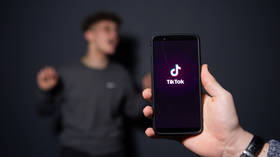US lawmakers demand TikTok probe over national security concerns – but US platforms meddling in China is just fine

US senators are demanding intelligence agencies investigate Chinese social media platform TikTok, concerned it could be used for "influence campaigns." But Twitter, YouTube and Facebook interfere in foreign nations with impunity.
Senators Chuck Schumer (D-New York) and Tom Cotton (R-Arkansas) have called for a probe of TikTok, a platform featuring short videos that became the most-downloaded app in the App Store earlier this year, citing concerns its irresistible memes could be turning American youth against the American way.
Also on rt.com US blacklists major Chinese AI startups 2 days ahead of trade talksThe pair implored Director of National Intelligence Joseph Maguire to "conduct an assessment of the national security risks posed by TikTok and other China-based content platforms operating in the US," warning the platform could play host to "foreign influence campaigns like those carried out during the 2016 election." TikTok isn't the first Chinese company to be targeted for perceived un-American activities – Washington's insistence that Huawei is secretly funneling users' data to Beijing has led the Trump administration to threaten allies with being cut off from US intelligence unless they bar the Chinese tech firm from deploying its nascent 5G infrastructure. While no evidence has been found to back those suspicions, Huawei has found itself exiled to the US trade blacklist.
It's not surprising that the US suspects China of spying via its tech firms - that's how the US has operated for years. US tech firms have an unhealthily close relationship with the NSA, whether it's bulk data collection by telecoms AT&T and Verizon or backdooring of social media platforms like Facebook and Twitter. The CIA and FBI both use social media platforms for surveillance to keep tabs on dissidents, immigrants and other persons of interest, and those platforms regularly delete accounts on orders from Washington.
American social media firms are demonstrably meddling in Chinese politics, deplatforming hundreds of accounts critical of the protests in Hong Kong while allowing content supporting the rioters to spread widely. Facebook, Twitter, and YouTube is banned in mainland China, but they can be accessed using VPNs and are used by many Hong Kong residents.
Also on rt.com Big Tech & Big Brother meet at Facebook HQ to discuss how to ‘secure’ US electionsNor is China the only country on the receiving end of American social media-driven meddling – the FBI uses Facebook to (sloppily) recruit Russians to spy on their own government. Twitter recently banned all state-owned media from buying ads – an act of utter hypocrisy given that its editorial executive responsible for the Middle East was reported last month to be a psychological warfare officer in the British Army.
TikTok parent company ByteDance is not even suspected of anything on that scale, and has pushed back indignantly against accusations of working for Beijing, reminding Washington that data on US users is stored in the US. The platform has been accused of censoring posts about the unrest in Hong Kong, Tiananmen Square, and Tibetan independence, based on a set of guidelines leaked earlier this year, but ByteDance says the guidelines have been replaced with localized moderation, meaning what's censored in Hong Kong may be available in the US.
Security executives from all the major US social media platforms met with government agencies last month to discuss "securing" the 2020 elections, and the Pentagon has openly stated it intends to crack down on the spread of "polarizing" content on social media. TikTok worries American politicians not because it's controlled by Beijing, but because it isn't controlled by Washington.
By Helen Buyniski, RT
If you like this story, share it with a friend!












